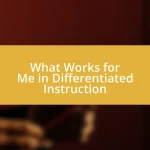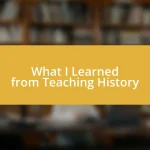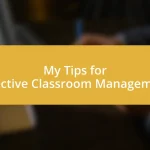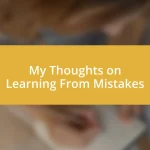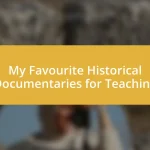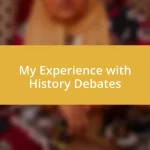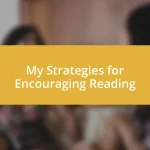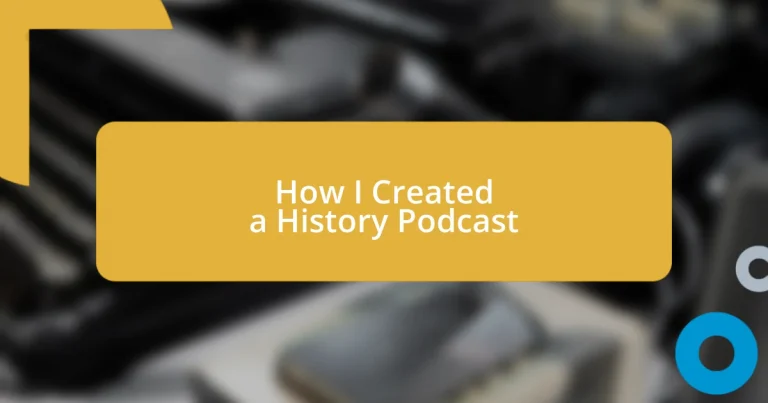Key takeaways:
- Choosing a specific podcast niche fosters deeper connections with listeners by transforming historical facts into relatable stories.
- Creating a detailed content strategy, including audience engagement and thematic storytelling, enhances the overall quality and relevance of the podcast.
- Effective promotion and monetization strategies, such as sponsorships and merchandise, can build community and strengthen listener loyalty.
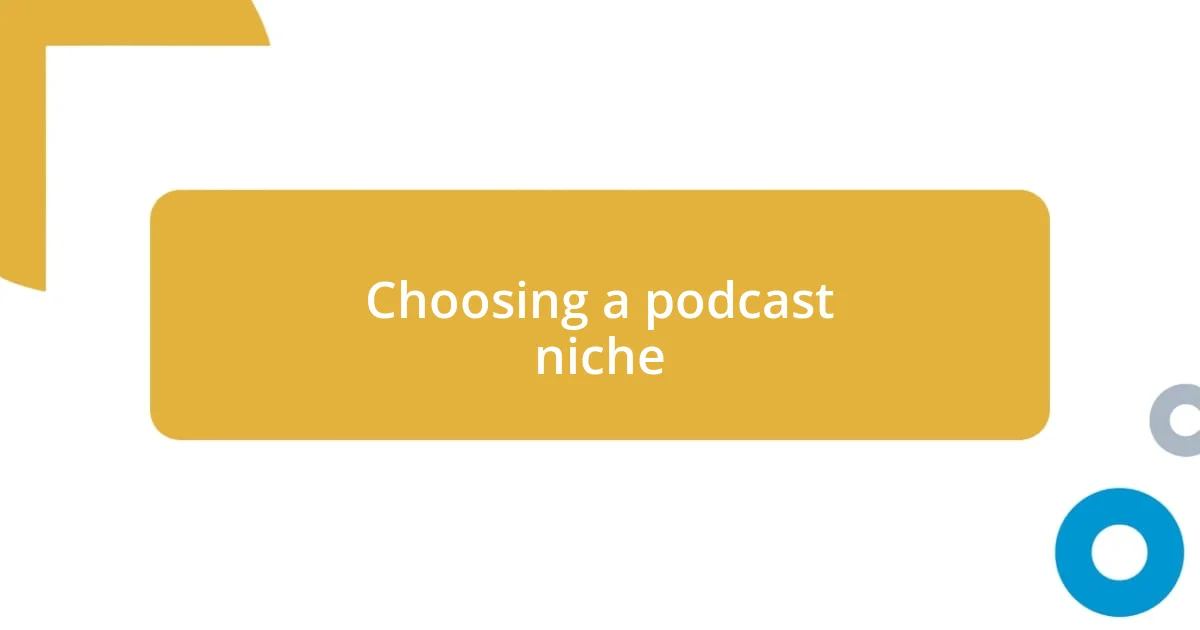
Choosing a podcast niche
Choosing a podcast niche can feel like standing at a crossroads, and I remember that moment vividly. As I pondered my love for history, I realized it wasn’t enough to just dive into any topic; I needed to narrow it down to what truly excited me. Have you ever felt overwhelmed with possibilities but also a spark of inspiration that guided you? That’s exactly what happened to me.
For instance, I thought about the various historical themes I could explore, from ancient civilizations to modern movements. I found myself gravitating toward lesser-known stories that captivated my interest, particularly the personal experiences of ordinary people in pivotal moments. This has not only fueled my passion but created a unique space in the podcasting world. What niche pulls at your heartstrings?
I also learned that your niche should resonate with your audience. I realized that by sharing the emotional depth of history, listeners could connect on a personal level, making the content more impactful. Isn’t it fascinating how a precise focus can transform mundane facts into relatable stories that linger in the mind? By tapping into this idea, I forged a connection with my growing audience, ensuring that my podcast felt tailored just for them.
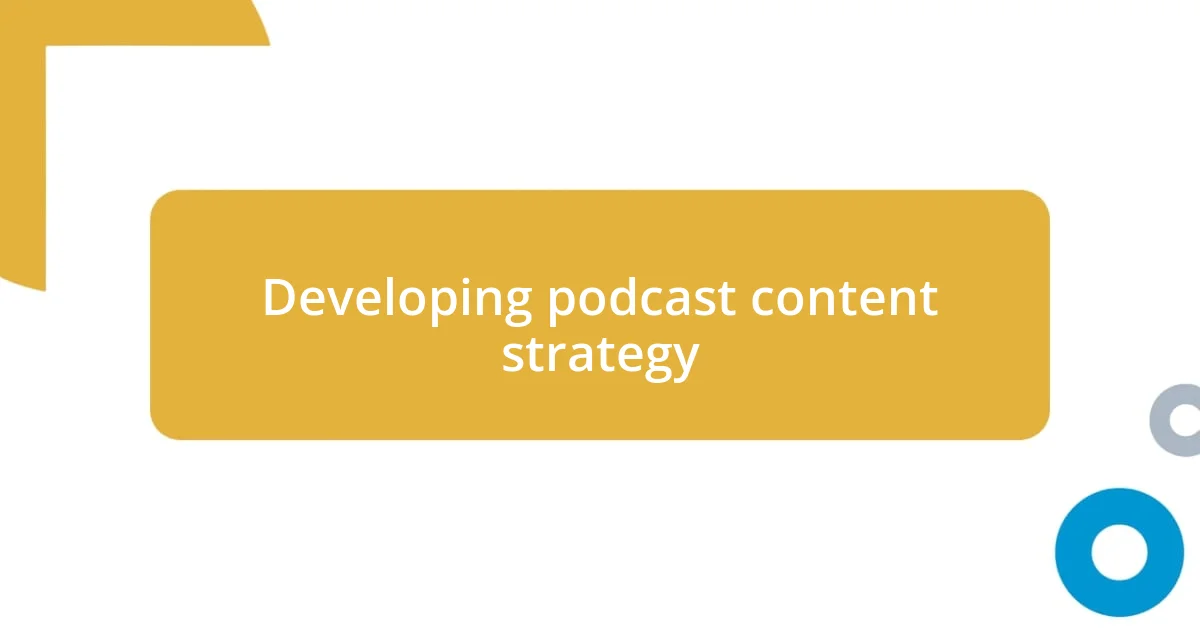
Developing podcast content strategy
To effectively develop a podcast content strategy, I found that planning my episodes ahead of time was essential. Initially, I sketched out topics that aligned with my historical niche, but as I delved deeper into my research, I discovered that the actual process was much more dynamic. Have you ever plotted out a journey, only to take unexpected detours that lead to fascinating discoveries? That’s the essence of creating compelling content for your listeners.
One method that worked particularly well for me was creating a series of themes for my episodes. This not only helped maintain a cohesive narrative across different episodes but also allowed me to interweave personal stories or anecdotes that enhanced the historical context. For example, when discussing a specific historical event, I would pair it with a personal reflection on how it impacts our lives today. It’s incredible how connecting past and present ignites curiosity—who doesn’t want to relate to history in a meaningful way?
In addition, I realized the importance of audience engagement. By encouraging feedback through social media or within the podcast itself, I could ascertain what my listeners found captivating. Understanding their interests gave me invaluable insight into shaping my content strategy. Think about it: when your audience feels involved, they not only become loyal listeners but often offer fresh ideas that keep the podcast alive and evolving.
| Content Strategy Component | Description |
|---|---|
| Planning Episodes | Sketching topics allows for focused and cohesive episodes. |
| Thematic Series | Building episodes around themes helps to connect stories and engage listeners. |
| Audience Engagement | Feedback fosters loyalty and provides ideas for future content. |
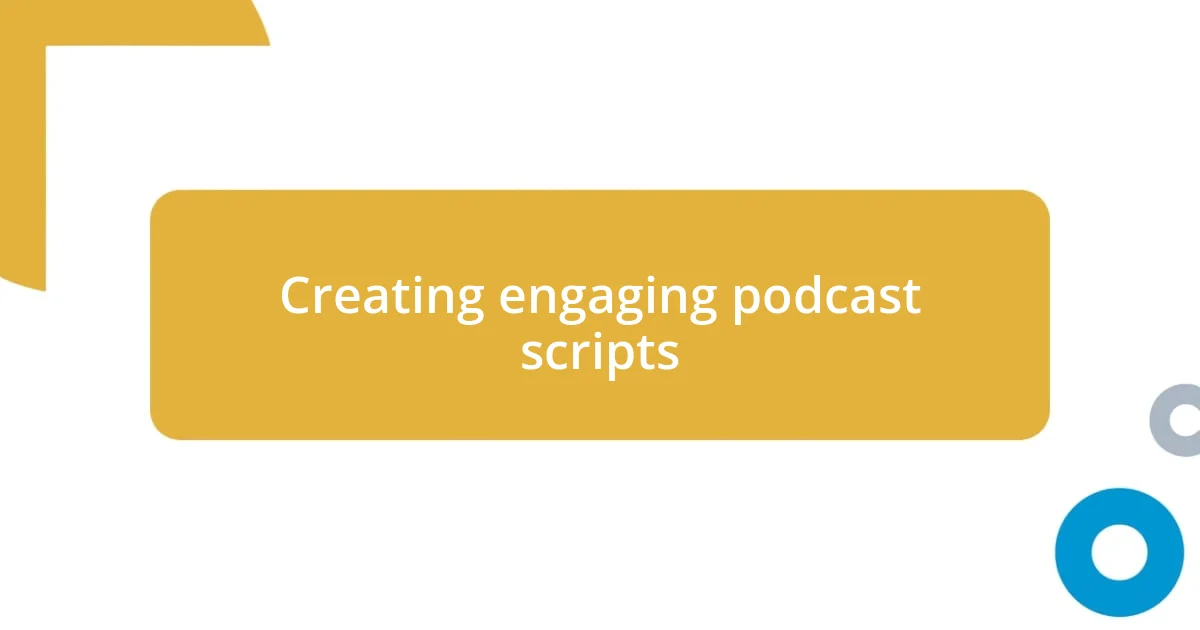
Creating engaging podcast scripts
Creating engaging podcast scripts is an art form that I’ve learned to master over time. One of the most rewarding aspects is weaving storytelling into the facts. When I write my scripts, I envision how I want my listeners to feel. I often think back to a particular episode where I discussed the life of a little-known historical figure. By sharing the emotional struggles they faced, I saw how it transformed the script from mere facts into a story that really connected with listeners. That emotional thread makes the narrative come alive and keeps the audience hanging on every word.
Here are some strategies I’ve found effective for writing engaging scripts:
– Create Short, Punchy Sentences: These grab attention and make listening easier.
– Use Descriptive Language: This helps paint a vivid picture for your audience, immersing them in the story.
– Incorporate Quotes or Anecdotes: Real-life experiences and quotes from historical figures can add authenticity and depth to your podcast.
– Ask Rhetorical Questions: This engages listeners and encourages them to think critically about the content.
– Maintain a Conversational Tone: Writing as if you’re speaking directly to a friend invites warmth and connection.
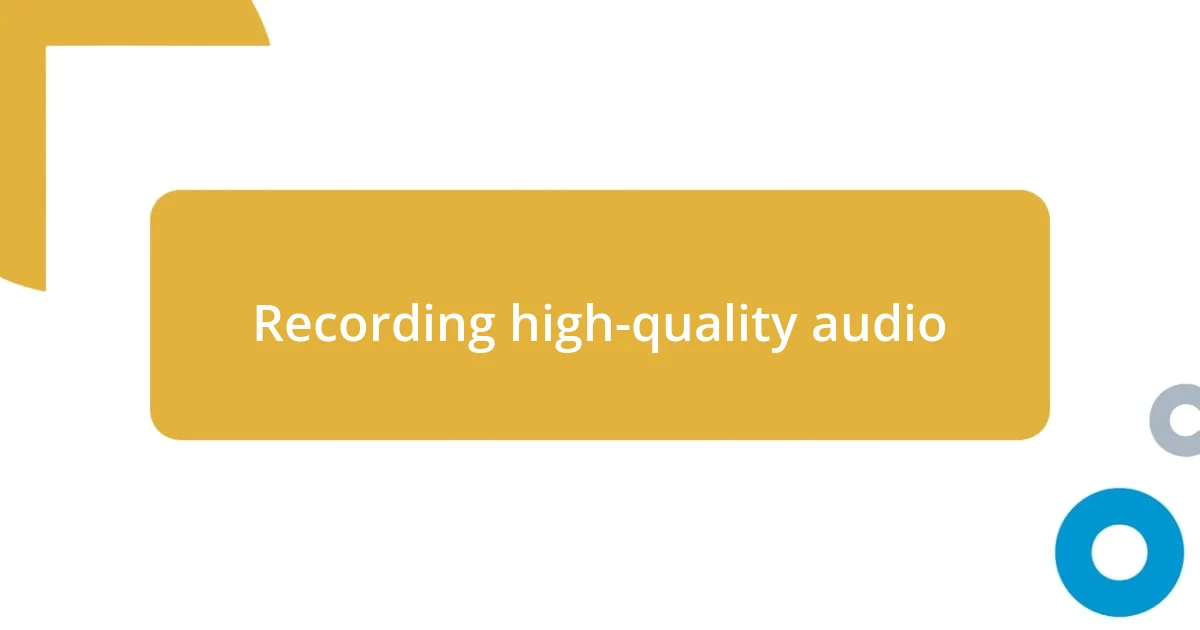
Recording high-quality audio
Recording high-quality audio is something I found to be incredibly crucial in the podcasting process. I once recorded an entire episode only to discover that my microphone had picked up background noise from the bustling café I was sitting in. It made me realize just how impactful location and acoustics can be on the overall listening experience.
Investing in a good microphone was a game changer for me. I initially started with a basic webcam mic, which left much to be desired. Upgrading to a decent USB microphone not only improved clarity but also brought a richness to my voice that really made a difference in conveying emotion. Have you ever listened to a podcast where the host’s voice felt distant? It can create a disconnect that distracts from the content, so choosing the right equipment is essential.
I also learned that environment matters just as much as the equipment. Creating a dedicated recording space, free from interruptions, helped elevate the overall audio quality immensely. I often draped blankets around the room to absorb sound, which might seem odd, but it really worked! I remember feeling a surge of pride the first time I listened back to an episode where everything sounded crisp and clear. There’s something satisfying about knowing that your listeners can fully immerse themselves in your stories without distraction.
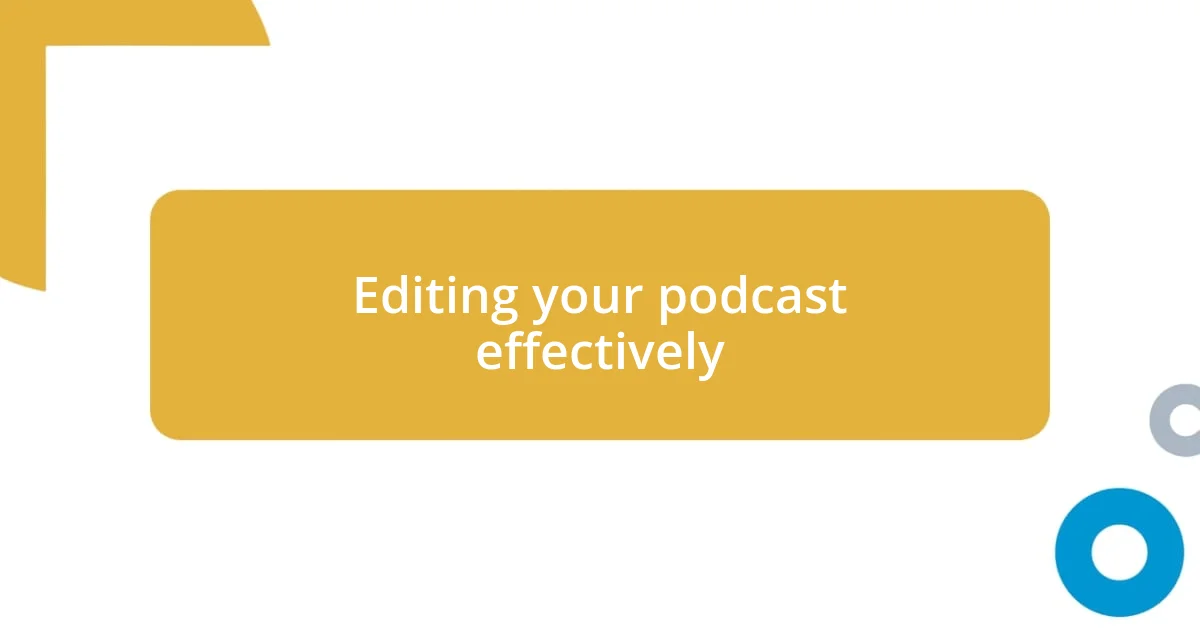
Editing your podcast effectively
Editing your podcast effectively is where the real magic happens. I found that after hours of recording, listening back can feel like unearthing hidden treasures and decisions about what to keep or trim can be emotional. I remember one episode where I had a heartfelt tangent that didn’t quite fit. Cutting it felt like losing a part of myself, but I knew it was crucial for maintaining the episode’s flow. Have you ever sat through an overly long interview or a story that lingered too long? Maintaining your listeners’ attention means knowing when to let go.
I became a big fan of editing software that allows for precise cuts. At first, I struggled with more complex tools and felt overwhelmed. However, as I practiced, I discovered how to leverage features like noise reduction and sound leveling. It was exhilarating to hear my voice become more polished, creating a better listening experience. I’ll never forget the thrill of rearranging clips to create a more coherent narrative. It’s almost like arranging pieces of a puzzle until everything fits just right.
Additionally, don’t underestimate the importance of pacing. I learned that silence can be powerful; sometimes, a brief pause can let a poignant point sink in. After realizing that, I became more intentional about where I placed my edits, allowing moments of reflection that enhance the narrative. My listeners would often tell me how those pauses made them think deeper about the topics I covered. It’s about creating a rhythm, one that feels natural and makes the storytelling come alive. Have you paid attention to how silence can shift the mood in a conversation? In podcasting, those moments can truly resonate.
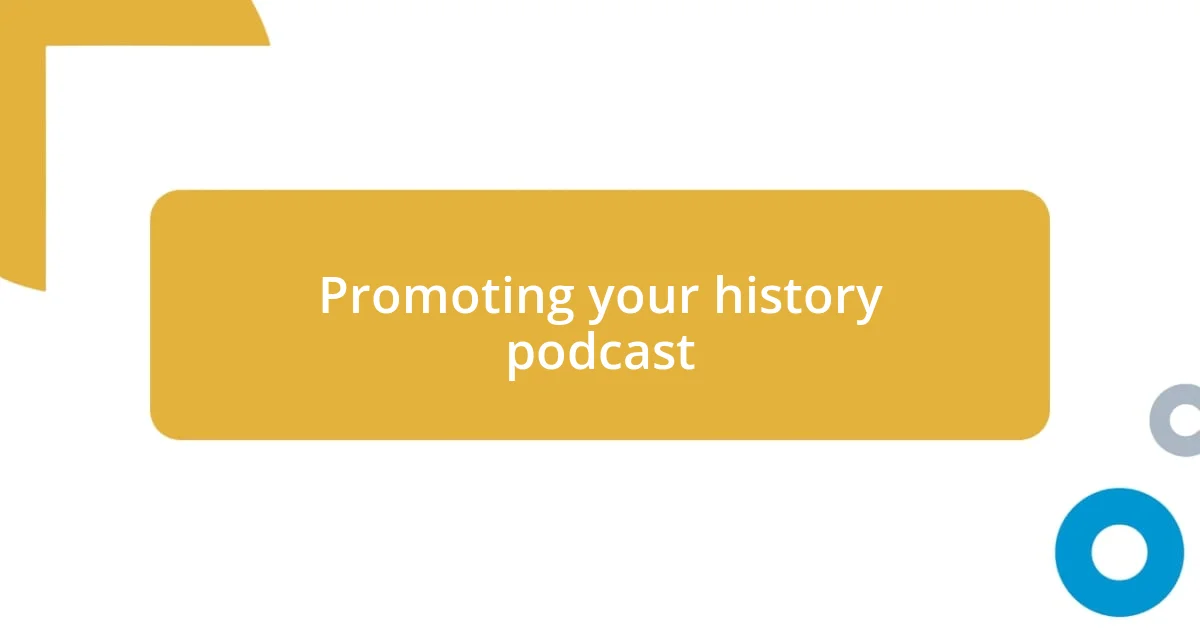
Promoting your history podcast
Promoting your history podcast goes beyond just creating great content; it’s about connecting with your audience. I remember excitedly sharing my first episode on social media, only to realize that simply posting it wasn’t enough. I started to engage with fellow history enthusiasts, joining online forums and groups where I could share insights and promote my podcast organically. Has anyone ever given you the impression that they’re just interested in promoting themselves? It’s crucial to build genuine relationships to foster lasting connections with your listeners.
One of my favorite promotional strategies involved collaborating with other podcasters. I reached out to a few hosts who had a similar audience, and we exchanged promotional spots. I still recall the surge of excitement when I got a message from a listener who discovered my podcast through a recommendation. It’s such an affirmation that your hard work is paying off. Why wouldn’t you want to take advantage of existing networks? It’s a powerful way to enhance credibility while tapping into established audiences.
Email newsletters transformed my promotional efforts as well. I found that weaving personal stories or behind-the-scenes insights made my updates more relatable. Each time I wrote a newsletter, I imagined sitting down with my listeners over coffee, sharing not just episode highlights, but also my own reflections on the themes we explored. Don’t you think it’s more inviting when communication feels personal? The response I received was heartwarming; my audience felt more connected, and that made promoting my podcast feel less like a chore and more like an exciting conversation.
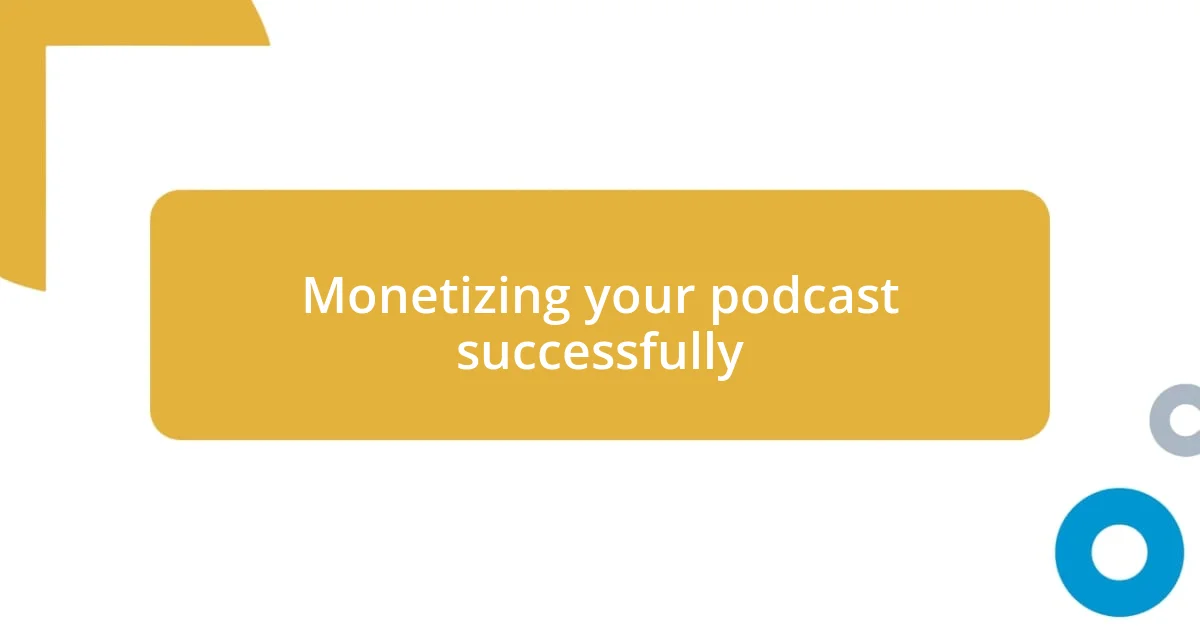
Monetizing your podcast successfully
Monetizing your podcast is a crucial step that can sometimes feel overwhelming, but I’ve learned to take it one strategy at a time. Initially, I hesitated to mention sponsorships, fearing it might compromise my authenticity. However, when I landed my first sponsor, I realized it could actually enhance the content. The sponsor was closely aligned with my podcast’s theme, allowing me to present their products naturally within my discussions. Have you ever thought about how well-placed ads can actually provide value to your audience?
Another effective method I’ve used is offering exclusive content through Patreon. When I first started, I barely imagined that listeners would pay for bonus episodes or behind-the-scenes content. But I still remember the thrill when the first few supporters signed up—it felt like they were joining a community rather than just tuning in. This approach not only helped me cover costs but also fostered a deeper connection with my audience. Isn’t it exciting to think of your audience as co-creators in your podcast journey?
Merchandising has also been a delightful surprise in my monetization efforts. I was initially skeptical, but I launched a few items related to my podcast—like themed mugs and t-shirts featuring quotes from my episodes. The first time I saw someone wearing my merchandise in public, I couldn’t help but smile. It was a tangible reminder that my work resonated with people. Have you ever considered how merchandise can create a sense of belonging among listeners? It’s not just about selling; it’s about building a brand that your audience feels proud to support.


